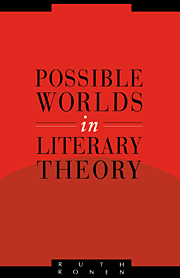
-
Select format
-
- Publisher:
- Cambridge University Press
- Publication date:
- November 2009
- May 1994
- ISBN:
- 9780511597480
- 9780521450171
- 9780521456487
- Dimensions:
- (216 x 138 mm)
- Weight & Pages:
- 0.47kg, 260 Pages
- Dimensions:
- (216 x 138 mm)
- Weight & Pages:
- 0.34kg, 260 Pages
- Subjects:
- Literature, Philosophy: General Interest, Literary Theory
- Series:
- Literature, Culture, Theory (7)
You may already have access via personal or institutional login- Subjects:
- Literature, Philosophy: General Interest, Literary Theory
- Series:
- Literature, Culture, Theory (7)
Book description
The concept of possible worlds, originally introduced in philosophical logic, has recently gained interdisciplinary influence; it proves to be a productive tool when borrowed by literary theory to explain the notion of fictional worlds. In this book Ruth Ronen develops a comparative reading of the use of possible worlds in philosophy and in literary theory, and offers an analysis of the way the concept contributes to our understanding of fictionality and the structure and ontology of fictional worlds. Dr Ronen suggests a new set of criteria for the definition of fictionality, making rigorous distinctions between fictional and possible worlds; and through specific studies of domains within fictional worlds - events, objects, time, and point of view - she proposes a radical rethinking of the problem of fictionality in general and fictional narrativity in particular.
Reviews
"...Ronen's book is a most valuable and exciting contribution of great interest to two communities of specialized readers: those interested in the general dynamics of theory formation in cultural studies and those whose interests focus on one central issue in this sphere, fictional worlds and their constitutive domains." Uri Margolin, Style
"...illuminates the logic underlying an important interdisciplinary borrowing and constitutes a powerful reassessment of fictional narrativity. It is a splendid performance." Gerald Prince, Language of Design
Contents
Metrics
Full text views
Full text views help Loading metrics...
Loading metrics...
* Views captured on Cambridge Core between #date#. This data will be updated every 24 hours.
Usage data cannot currently be displayed.
Accessibility standard: Unknown
Why this information is here
This section outlines the accessibility features of this content - including support for screen readers, full keyboard navigation and high-contrast display options. This may not be relevant for you.
Accessibility Information
Accessibility compliance for the PDF of this book is currently unknown and may be updated in the future.


